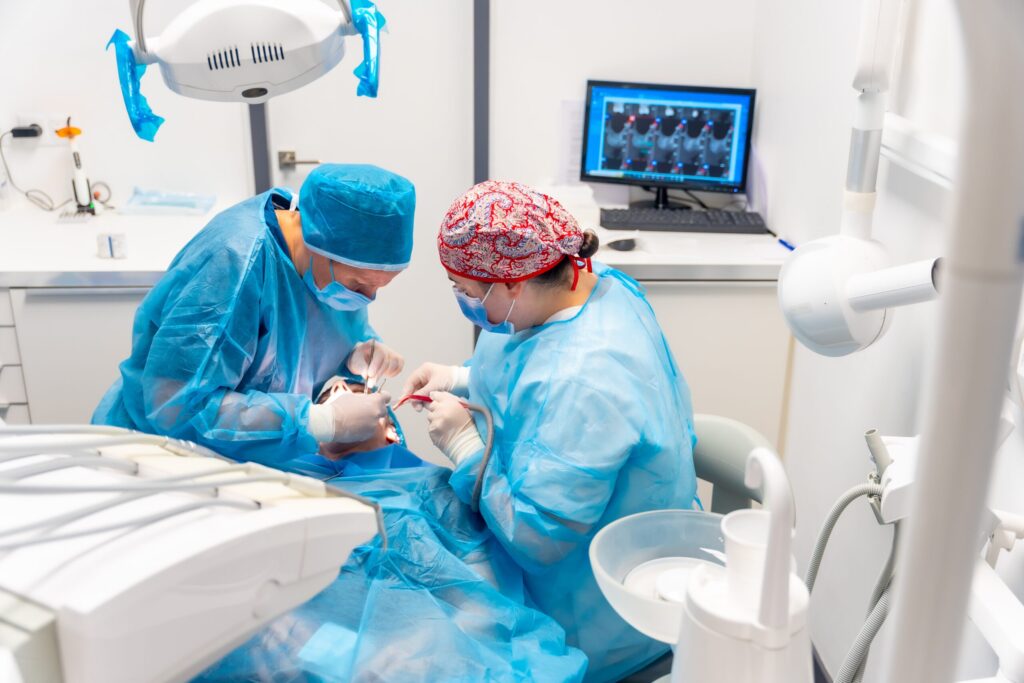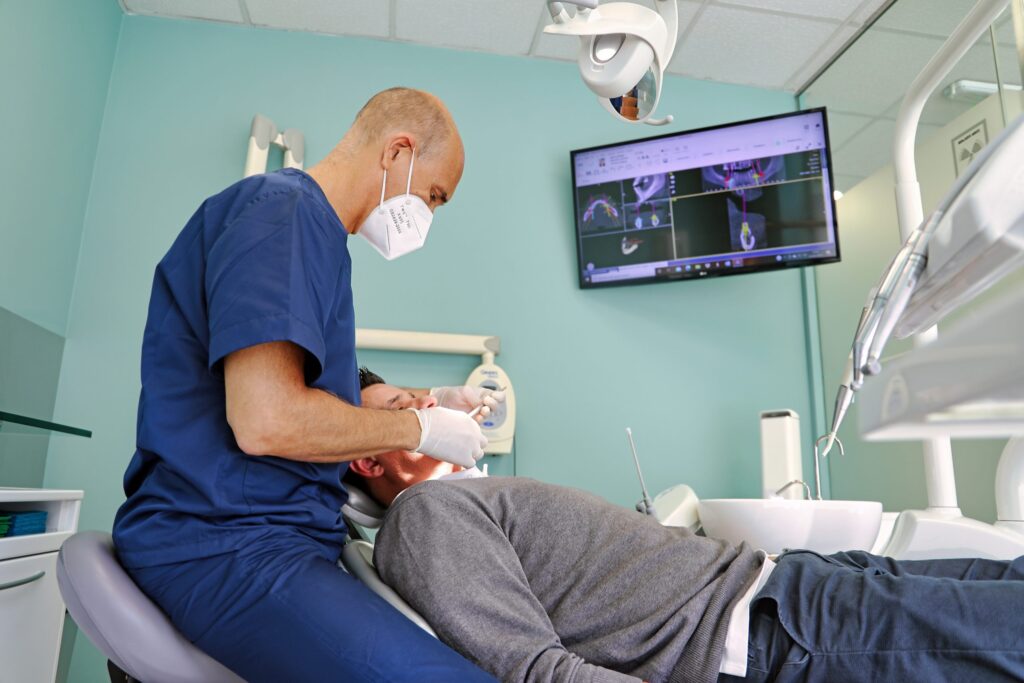If you’re planning to get dental implants, you might be wondering whether you’ll be put to sleep during the procedure. The short answer is: not always. Most dental implant procedures are performed under local anesthesia, meaning you’re awake but the area is completely numb. However, sedation options do exist depending on your comfort level, the complexity of your case, and your dental anxiety.
Understanding how anesthesia and sedation work during dental implant treatment can help reduce fear, ensure safety, and improve your overall treatment experience. Below, you’ll find everything you need to know about being asleep or awake during the procedure.

What Will You Read?
What Does It Mean to Be Put to Sleep for Dental Implants?
In dental terms, being “put to sleep” refers to general anesthesia, a controlled state where you are completely unconscious, feel no pain, and have no memory of the procedure. This is rarely used in implant dentistry, especially for single or multiple implant placements.
Instead, most patients receive one of the following:
- Local anesthesia: Numbs the treatment area. You’re awake and aware.
- Conscious sedation: Reduces awareness and anxiety. You remain responsive.
- IV sedation: A deeper form of conscious sedation through intravenous medication.
- General anesthesia: Full unconsciousness, used in hospital settings or complex surgeries.
So, are you always put to sleep for implants? No. But in some cases, sedation or general anesthesia might be preferred.
When Is General Anesthesia Used in Dental Implant Surgery?
Although uncommon, general anesthesia may be recommended in specific cases such as:
- Full-mouth dental implants
- Complex bone grafting procedures
- Patients with severe dental phobia
- Children or adults with special needs
- Prolonged or multiple surgeries scheduled in one session
In these situations, your dental surgeon will typically work with an anesthesiologist to monitor your safety. This is often done in a hospital or surgical center, not a regular dental office.

Most Common Sedation Methods for Dental Implants
Here’s a quick overview of the different levels of sedation dentistry used during implant surgery:
| Sedation Type | Patient State | Administered How | Common Use Cases |
|---|---|---|---|
| Local Anesthesia | Awake, alert | Injection | Standard implant placement |
| Oral Sedation | Awake, drowsy | Pill (e.g., diazepam) | Mild anxiety, single implant procedures |
| IV Sedation | Semi-conscious | Intravenous line | Severe anxiety, multiple implants |
| General Anesthesia | Fully unconscious | IV or inhaled gas | Complex surgery, medically necessary cases |
Local anesthesia is the default and safest method. However, patients with extreme dental anxiety often request oral or IV sedation to stay calm and comfortable.
What to Expect During the Procedure with Sedation
If you choose local anesthesia only, you’ll be:
- Fully awake
- Aware of your surroundings
- Unable to feel any pain due to numbing
With oral or IV sedation, you might feel:
- Drowsy or relaxed
- Slightly unaware of time passing
- Able to respond to instructions, but not bothered by the procedure
Those under general anesthesia will:
- Be fully asleep
- Have no awareness or memory
- Require someone to escort them home
- Need longer recovery time
Your dental team will explain all steps and provide pre- and post-op care instructions based on the sedation method.
Is It Safe to Be Put to Sleep for Dental Implants?
Yes, when performed by trained professionals in a safe setting, being put to sleep is safe. However, it’s important to understand that:
- General anesthesia carries higher risks compared to local or conscious sedation
- Pre-operative health screening is necessary
- Trained anesthesiologists must monitor your vital signs throughout the procedure
For most patients, sedation dentistry offers a safer and more comfortable alternative without full unconsciousness. It balances relaxation and awareness, reducing risks and costs.
Do You Need to Be Asleep for Full Mouth Dental Implants?
Full mouth dental implants usually involve more complex planning and multiple implant placements. In such cases:
- IV sedation is commonly preferred for comfort
- General anesthesia may be used when multiple procedures are combined (e.g., extractions, sinus lift, bone grafting)
- Patients with low pain tolerance or high anxiety often choose deeper sedation
However, many clinics, especially in Turkey, perform even full-mouth implant surgeries successfully under local anesthesia with mild sedation, reducing both risk and cost.
Choosing the Right Sedation Option
Your dentist will recommend a sedation option based on:
- Your medical history
- Level of anxiety
- Number of implants
- Duration of surgery
- Budget and preference
If you have no major health issues and are undergoing a straightforward implant procedure, local anesthesia is typically sufficient.
Advantages of Staying Awake During Dental Implants
There are several benefits to staying awake and alert:
- Faster recovery
- Lower cost
- Minimal medical risk
- No need for hospital setting
- You can return home sooner
For those with moderate anxiety, oral sedation offers the perfect balance between relaxation and control.
Can You Request to Be Put to Sleep?
Yes, but not all clinics offer general anesthesia. It depends on:
- The clinic’s capabilities
- Availability of anesthesiologists
- The nature of your treatment
In countries like the UK or USA, general anesthesia for dental implants is more tightly regulated and expensive. In contrast, Turkey offers a wider range of options including conscious sedation and IV sedation in private clinics equipped for implant surgery.
How Much Does Sedation or General Anesthesia Cost?
The cost of anesthesia depends on:
- Type of sedation
- Treatment complexity
- Clinic location
- Duration of the procedure
Here’s a cost comparison:
| Country | Local Anesthesia | IV Sedation | General Anesthesia |
|---|---|---|---|
| USA | Included | $500–$1,000 | $1,500–$5,000 |
| UK | Included | £400–£800 | £1,200–£4,000 |
| Turkey | Included | $150–$400 | $500–$1,200 |
This is one reason why patients from abroad increasingly prefer dental implant treatment in Turkey: they can access affordable sedation options, high-quality care, and internationally trained specialists.
Getting Dental Implants in Turkey with Comfortable Sedation
Many patients seek dental implants abroad not just for affordability, but also for personalized care. In Turkey, top clinics offer:
- Multiple sedation options, including IV and oral sedation
- Modern facilities with hospital-grade safety standards
- Transparent pricing with no hidden anesthesia fees
- Staff experienced in treating international patients
- Multilingual communication, easing your journey
Whether you’re nervous about pain, or simply want a more relaxed experience, clinics in Turkey can tailor the sedation method to your needs without compromising on safety.
Final Thoughts
You are not automatically put to sleep for dental implants. Most implant surgeries are performed while you are awake, using local anesthesia to ensure a pain-free experience. However, for more complex cases or higher anxiety levels, oral or IV sedation can offer extra comfort. General anesthesia is rarely necessary but remains an option in specific situations.
Choosing the right approach depends on your medical history, treatment complexity, and comfort level. If you’re considering dental implants and looking for affordable yet advanced sedation options, Turkey offers a highly competitive and patient-focused solution.

 Dijital Performans Ajansı.
Dijital Performans Ajansı.